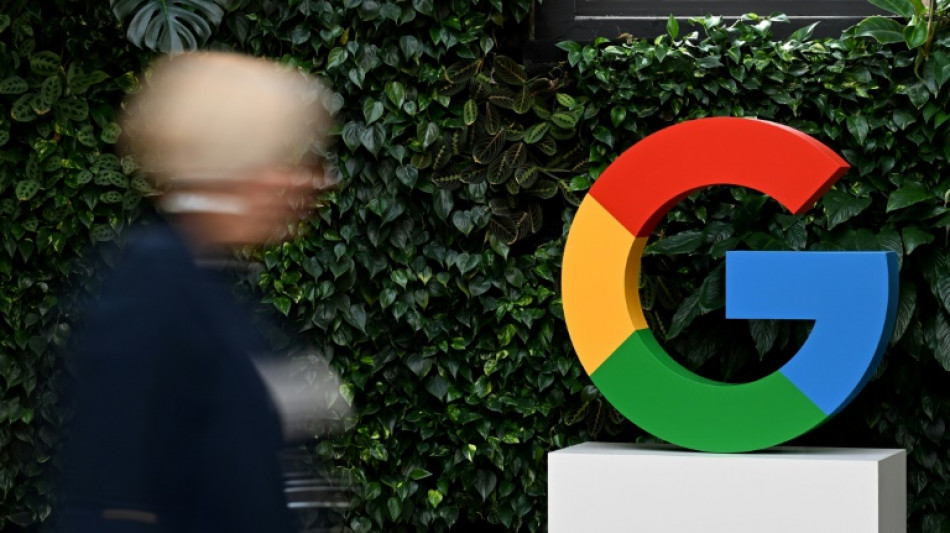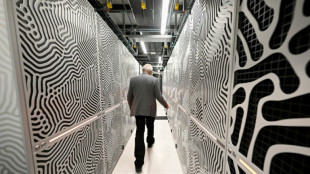
-
 Japa's Miura and Kihara capture Skate America pairs gold
Japa's Miura and Kihara capture Skate America pairs gold
-
Who can qualify for 2026 World Cup in final round of European qualifiers

-
 UK to cut protections for refugees under asylum 'overhaul'
UK to cut protections for refugees under asylum 'overhaul'
-
England's Tuchel plays down records before final World Cup qualifier

-
 Depoortere double helps France hold off spirited Fiji
Depoortere double helps France hold off spirited Fiji
-
Scotland face World Cup shootout against Denmark after Greece defeat

-
 Hansen hat-trick inspires Irish to record win over Australia
Hansen hat-trick inspires Irish to record win over Australia
-
Alcaraz secures ATP Finals showdown with 'favourite' Sinner

-
 UK to cut protections for refugees under asylum 'overhaul': govt
UK to cut protections for refugees under asylum 'overhaul': govt
-
Spain, Switzerland on World Cup brink as Belgium also made to wait

-
 Sweden's Grant leads by one at LPGA Annika tournament
Sweden's Grant leads by one at LPGA Annika tournament
-
Scotland cling to hopes of automatic World Cup qualification despite Greece defeat

-
 Alcaraz secures ATP Finals showdown with great rival Sinner
Alcaraz secures ATP Finals showdown with great rival Sinner
-
England captain Itoje savours 'special' New Zealand win

-
 Wales's Evans denies Japan historic win with last-gasp penalty
Wales's Evans denies Japan historic win with last-gasp penalty
-
Zelensky renews calls for more air defence after deadly strike on Kyiv

-
 NBA's struggling Pelicans sack coach Willie Green
NBA's struggling Pelicans sack coach Willie Green
-
Petain tribute comments raise 'revisionist' storm in France

-
 Spain on World Cup brink as Belgium also made to wait
Spain on World Cup brink as Belgium also made to wait
-
Spain virtually seal World Cup qualification in Georgia romp

-
 M23, DR Congo sign new peace roadmap in Doha
M23, DR Congo sign new peace roadmap in Doha
-
Estevao, Casemiro on target for Brazil in Senegal win

-
 Ford steers England to rare win over New Zealand
Ford steers England to rare win over New Zealand
-
Massive march in Brazil marks first big UN climate protest in years

-
 Spain rescues hundreds of exotic animals from unlicensed shelter
Spain rescues hundreds of exotic animals from unlicensed shelter
-
Huge fire sparked by explosions near Argentine capital 'contained'

-
 South Africa defy early red card to beat battling Italy
South Africa defy early red card to beat battling Italy
-
Sinner beats De Minaur to reach ATP Finals title match

-
 Zelensky vows overhaul of Ukraine's scandal-hit energy firms
Zelensky vows overhaul of Ukraine's scandal-hit energy firms
-
South Africa defy early red card to beat Italy

-
 Alex Marquez claims Valencia MotoGP sprint victory
Alex Marquez claims Valencia MotoGP sprint victory
-
McIlroy shares lead with Race to Dubai title in sight

-
 Climate protesters rally in Brazil at COP30 halfway mark
Climate protesters rally in Brazil at COP30 halfway mark
-
Spike Lee gifts pope Knicks jersey as pontiff meets film stars

-
 BBC caught in crossfire of polarised political and media landscape
BBC caught in crossfire of polarised political and media landscape
-
'Happy' Shiffrin dominates in Levi slalom for 102nd World Cup win

-
 Palestinian national team on 'mission' for peace in Spain visit
Palestinian national team on 'mission' for peace in Spain visit
-
Brazilian 'Superman' cheers child cancer patients in Ghana

-
 India close in on win over South Africa after Jadeja heroics
India close in on win over South Africa after Jadeja heroics
-
Huge explosions rock industrial area near Argentina's capital

-
 Bezzecchi takes pole for Valencia sprint and MotoGP
Bezzecchi takes pole for Valencia sprint and MotoGP
-
Dominant Shiffrin leads after first slalom run in Levi

-
 Nine killed in accidental explosion at Indian Kashmir police station
Nine killed in accidental explosion at Indian Kashmir police station
-
Climate protesters to rally at COP30's halfway mark

-
 Fighting South Africa lose Rickelton after India 189 all out
Fighting South Africa lose Rickelton after India 189 all out
-
Harmer leads South Africa fightback as India 189 all out

-
 Prison looms for Brazil's Bolsonaro after court rejects his appeal
Prison looms for Brazil's Bolsonaro after court rejects his appeal
-
EU bows to pressure on loosening AI, privacy rules

-
 India close in on lead despite South African strikes
India close in on lead despite South African strikes
-
Curry's 49 points propel Warriors in 109-108 win over Spurs


Europe seeks to break its US tech addiction
With President Donald Trump more unpredictable than ever and transatlantic ties reaching new lows, calls are growing louder for Europe to declare independence from US tech.
From Microsoft to Meta, Apple to Uber, cloud computing to AI, much of the day-to-day technology used by Europeans is American.
The risks that brings were hotly debated before Trump returned to power, but now Europe is getting serious -- pushing to favour European firms in public contracts and backing European versions of well-known US services.
As Europe faces Trump's tariffs, and threatens to tax US tech unless the two sides clinch a deal averting all-out trade war, there is a growing sense of urgency.
Tech sovereignty has been front and centre for weeks: the European Union unveiled its strategy to compete in the global artificial intelligence race and is talking about its own payment system to rival Mastercard.
"We have to build up our own capacities when it comes to technologies," EU tech chief Henna Virkkunen has said, identifying three critical sectors: AI, quantum and semiconductors.
A key concern is that if ties worsen, Washington could potentially weaponise US digital dominance against Europe -- with Trump's administration already taking aim at the bloc's tech rules.
That is giving fresh impetus to demands by industry, experts and EU lawmakers for Europe to bolster its infrastructure and cut reliance on a small group of US firms.
"Relying exclusively on non-European technologies exposes us to strategic and economic risks," said EU lawmaker Stephanie Yon-Courtin, who focuses on digital issues, pointing to US limits on semiconductor exports as one example.
- 'Buy European' push -
The data paints a stark picture.
Around two-thirds of Europe's cloud market is in the hands of US titans: Amazon, Microsoft and Google, while European cloud providers make up only two percent.
Twenty-three percent of the bloc's total high-tech imports in 2023 came from the United States, second only to China -- in everything from aerospace and pharmaceutical tech to smartphones and chips.
Although the idea of a European social media platform to rival Facebook or X is given short shrift, officials believe that in the crucial AI field, the race is far from over.
To boost European AI firms, the EU has called for a "European preference for critical sectors and technologies" in public procurement.
"Incentives to buy European are important," Benjamin Revcolevschi, chief executive of French cloud provider OVHcloud, told AFP, welcoming the broader made-in-Europe push.
Alison James, European government relations lead at electronics industry association IPC, summed it up: "We need to have what we need for our key industries and our critical industries to be able to make our stuff."
There are calls for greater independence from US financial technology as well, with European Central Bank chief Christine Lagarde advocating a "European offer" to rival American (Mastercard, Visa and Paypal) and Chinese payment systems (Alipay).
Heeding the call, EU capitals have discussed creating a "truly European payment system".
Industry insiders are also aware building tech sovereignty requires massive investment, at a moment when the EU is pouring money into defence.
In an initiative called EuroStack, digital policy experts said creating a European tech ecosystem with layers including AI would cost 300 billion euros ($340 billion) by 2035.
US trade group Chamber of Progress puts it much higher, at over five trillion euros.
- Different values -
US Vice President JD Vance has taken aim at tech regulation in denouncing Europe's social and economic model -- accusing it of stifling innovation and unfairly hampering US firms, many of whom have aligned with Trump's administration.
But for many, the bloc's values-based rules are another reason to fight for tech independence.
After repeated abuses by US Big Tech, the EU created major laws regulating the online world including the Digital Markets Act (DMA) and the Digital Services Act (DSA).
Much to the chagrin of US digital giants, the EU in 2018 introduced strict rules to protect European users' data, and last year ushered in the world's broadest safeguards on AI.
In practice, supporters say the DMA encourages users to discover European platforms -- for instance giving users a choice of browser, rather than the default from Apple or Google.
Bruce Lawson of Norwegian web browser Vivaldi said there was "a significant and gratifying increase in downloads in Europe", thanks in large part to the DMA.
Lawson insists it's not about being anti-American.
"It's about weaning ourselves off the dependency on infrastructure that have very different values about data protection," Lawson said.
Pointing at rules in Europe that "don't necessarily exist in the United States", he said users simply "prefer to have their data processed by a European company".
T.Ibrahim--SF-PST




